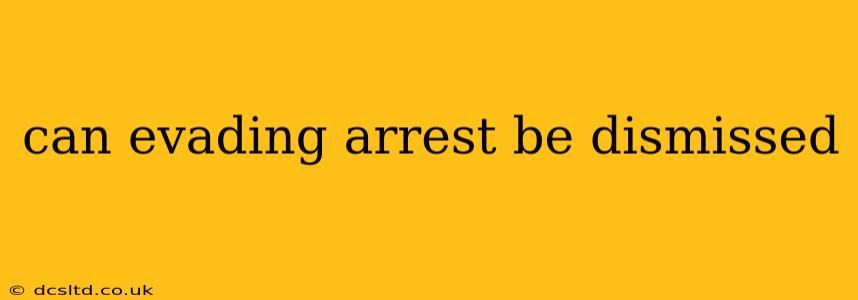Can Evading Arrest Be Dismissed? Understanding the Complexities of Charges
Evading arrest is a serious offense with potentially severe consequences. Whether charges for evading arrest can be dismissed depends on a multitude of factors, making it impossible to give a simple yes or no answer. This article will delve into the intricacies of these cases, exploring the various scenarios that might lead to a dismissal and the factors that influence the outcome.
Understanding the Offense:
Evading arrest, also known as fleeing or eluding police, involves intentionally avoiding apprehension by law enforcement. The severity of the charge often depends on the circumstances, including the actions of the accused, the actions of law enforcement, and the resulting consequences. Factors such as the speed of the pursuit, the presence of other vehicles or pedestrians, and the use of dangerous driving maneuvers all contribute to the potential penalties.
What Factors Can Lead to a Dismissal of Evading Arrest Charges?
Several factors can influence whether an evading arrest charge might be dismissed. These often involve legal arguments challenging the prosecution's case, rather than a simple "mistake" on the part of the accused.
1. Lack of Probable Cause: The police must have a reasonable suspicion or probable cause to believe a crime has been committed before initiating a pursuit. If the initial stop was unlawful, any subsequent evading arrest charge might be dismissed. This requires a careful examination of the events leading up to the pursuit.
2. Excessively Aggressive Police Pursuit: If the police conduct an excessively aggressive or reckless pursuit, endangering the public or acting outside their legal authority, the court might dismiss the charge. The defense may argue that the defendant's actions were a direct result of the police's actions, negating the intent to evade.
3. Insufficient Evidence: The prosecution must present sufficient evidence to prove beyond a reasonable doubt that the accused intentionally evaded arrest. Lack of clear evidence, such as dashcam footage, witness testimony, or other corroborating evidence, can weaken the case and potentially lead to a dismissal.
4. Entrapment: If the police instigated the crime, or coerced the defendant into evading arrest, it could constitute entrapment, a valid legal defense leading to dismissal. This requires demonstrating that the police created the situation that led to the evasion.
5. Procedural Errors: Errors made during the arrest process, such as an illegal search and seizure or a violation of Miranda rights, could lead to the dismissal of the charges. These are often technical errors, but they can have significant legal consequences.
6. Plea Bargains: While not a dismissal in the strict sense, many cases involving evading arrest are resolved through plea bargains. This might involve pleading guilty to a lesser charge in exchange for dropping the evading arrest charge.
Can a Misunderstanding Lead to a Dismissal?
While a simple misunderstanding is unlikely to lead to a complete dismissal, it might impact the severity of the charges or lead to a more lenient sentence. For instance, if the defendant genuinely didn't realize they were being pursued by law enforcement, this could be considered as mitigating circumstances. However, proving this requires strong evidence and a convincing defense.
What Happens if the Charges Aren't Dismissed?
If the charges are not dismissed, the consequences can be severe, including substantial fines, jail time, and a criminal record. The penalties vary depending on the jurisdiction and the specific circumstances of the case. Moreover, a conviction for evading arrest can lead to long-term repercussions, such as difficulties obtaining employment, housing, or professional licenses.
Seeking Legal Counsel:
Facing charges for evading arrest is a serious matter. It's crucial to consult with an experienced criminal defense attorney as soon as possible. A skilled attorney can assess the specifics of your case, identify potential defenses, and guide you through the legal process, maximizing your chances of a favorable outcome. The information provided here is for educational purposes only and does not constitute legal advice.
